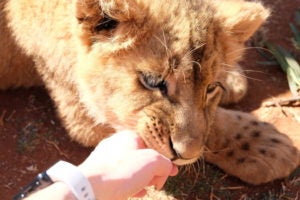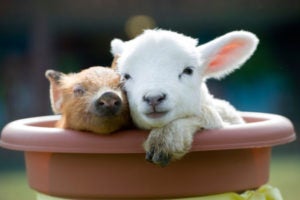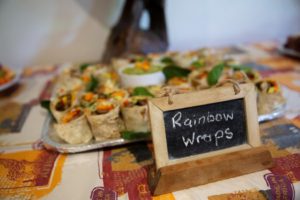
JOHANNESBURG—Animal protection organisations Humane Society International/Africa and FOUR PAWS South Africa join forces this World Animal Day with a roaring call to protect lions in South Africa from tourist exploitation. The organisations are urging travellers, travel guides and tour operators to fight lion exploitation by refusing to participate in or promote human-lion interactions, such as cub bottle-feeding or petting, walking with lions or canned trophy hunting. HSI/Africa and FOUR PAWS urge tourists to support ethical sanctuaries and wildlife game drives instead as a natural and cruelty-free alternative to see lions roaming freely in their natural habitat. Ethical tourists can also sign a petition hsi.org/snugglescam and take the #lionlongevityoath.
South Africa has an estimated 8,000 – 11,000 captive-bred lions being held in over 260 lion farms across the country. These lions suffer from a vicious cycle of exploitation, from cradle to grave. Unsuspecting visitors are often fooled into supporting and funding what HSI/Africa and FOUR PAWS call the ‘‘Snuggle Scam” by paying for selfie photo opportunities, including petting and bottle-feeding with very young lion cubs, or walking experiences with captive older lions. These lions are eventually offered to be shot as trophies or slaughtered in masses to meet the demand of the international lion-bone trade.
Audrey Delsink, wildlife director of HSI/Africa, said, “Most people come to South Africa because they love lions and other wild animals. They would be shocked to learn that the cute lion cubs they pose with for selfies will one day be killed for profit as trophies or bogus medicines. Lack of awareness of the suffering behind every cub photo or pay-to-pet experience, is one of the biggest drivers of this industry that ultimately ends with lions being sold to canned hunts to be shot by trophy hunters and their bones destined for the lion bone trade in Asia. We are thrilled to work with FOUR PAWS South Africa to raise awareness of the ‘Snuggle Scam’, to urge people to stay away from these facilities, and instead to see these magnificent animals in the wild where they belong.”
In the wild, lion cubs remain with their mothers for 18 months, and adult females don’t produce another litter for at least 15 to 24 months after giving birth. By contrast, cubs born on breeding farms are taken from their mothers when they are just a few days or even hours old, forcing the mother into an exhausting and continuous breeding cycle. These captive breeding females are incarcerated in enclosures their entire lives, sometimes without adequate food, hygiene or the ability to express their natural behaviours. The cubs are hand-reared by volunteers from around the globe paying thousands of dollars who are misled into believing the cubs are orphans.
Fiona Miles, director of FOUR PAWS in South Africa, said, “It is time for all of us to realise the part we play in the welfare of animals – especially in the instance of lions. We are happy to join forces with HSI/Africa and encourage tourists not to feed the cruel industry of captive breeding exploitation. We need the public’s help to end the #BigCatScam by vowing never to participate in any activity that exploit lions for commercial purposes. The FOUR PAWS project LIONSROCK Big Cat Sanctuary provides a true ethical experience, where no interaction or breeding is allowed. We provide a lifelong home for previously captive-bred and rescued big cats from across the globe, with more than 100 of these iconic animals in our care.”
The South African government sanctions the captive lion breeding industry and has established an export quota for the international lion bone trade, despite growing global outrage. In August this year, the Pretoria High Court declared the South African government’s 2017 and 2018 lion bone export quotas as “unlawful and constitutionally invalid”. South Africa is a popular tourist destination that welcomed approximately 10.3 million foreign tourists and facilitated 17.2 million domestic tourism trips in 2017 (South Africa Tourism Report 2017). The top 10 tourist arrivals in South Africa are from the United Kingdom, United States of America, Germany, France, Netherlands, Australia, India, China, Brazil and Canada.
ENDS
Key facts:
- Only about 20,000 lions remain in the wild in Africa.
- Between 8,000 – 11,000 captive-bred lions are suffering in captivity in some 260 facilities across South Africa, marketed to tourists as lion interaction experiences. With fewer than 3,000 wild lions, South Africa has more lions languishing in captivity than in the wild.
- Lions are a threatened species, listed as Vulnerable by the International Union for the Conservation of Nature. While the Convention on International Trade in Endangered Species of Wild Fauna and Flora prohibits the trade of bones from wild lions, it does allow South Africa to export bones from captive ones.
- It is impossible to differentiate body parts from wild vs. captive lions, so the legal export of captive lion bones facilitates the illegal export of wild lion bones.
MEDIA CONTACTS:
Humane Society International/Africa: Leozette Roode, media and outreach manager, 0713601104, lroode@hsi.org
FOUR PAWS South Africa: MJ Lourens, head of communications, 082 922 9046, mj.lourens@four-paws.org


